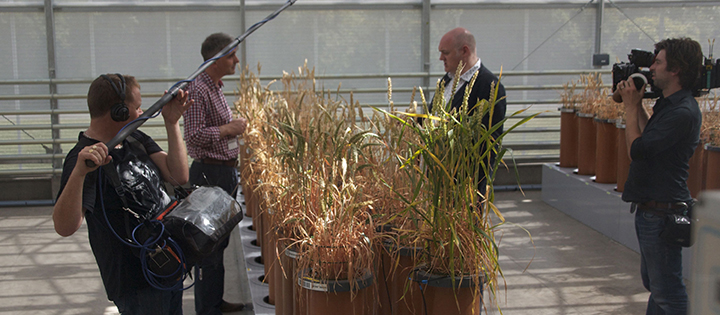
Want to learn more about working with the media? The benefits of engaging with the media? What to do if your research hits the headlines?
Tom Feilden, Science Editor at BBC Radio 4’s Today Programme will be joined by speakers from The Science Media Centre, the BBSRC press office and The Conversation for a media workshop at Sutton Bonington.
Tom, whose exclusive coverage was a key element of the world-wide media interest in The University of Nottingham’s AncientBiotics research, will be explaining why it is important for researchers to engage with the media.
He says: “There are two good reasons why scientists should engage with the media; first is its almost always really good fun, and second you have a duty to tell the taxpayer what you’ve done with their money.”
Chris Melvin, Media Officer for the BBSRC, will echo this sentiment with a talk on why funders like the BBSRC want their researchers to get their work out of the lab and into the public domain. He said: “Engaging with the media brings your work out of the lab and lets people know what scientists are doing with the money that funders like BBSRC provide on their behalf. Not only can working with the media help inform debate and build public support for science, it’s often a lot of fun and can boost a researcher’s career.”
Alice Kay, a Press Officer at The Science Media Centre will be giving advice on how their team can help when science hits the headlines.
There will also be a talk from Dr Rachael Tarlinton, from the School of Veterinary Medicine and Science. Rachael’s research into Schmallenberg virus was picked up extensively by the national media when the virus took hold in the UK back in 2013. The coverage, which included Newsnight, brought with it offers of new contacts for potential research collaborations, commissioned work from a vaccine manufacturer and a visit from specialist vets from the USA.
Rachael said: “How is your work of any use if it’s hidden under a bushel? I see media and public engagement as an essential part of our job.”
Will de Freitas, edits The Conversation’s Environment and Energy section. Will have been with The Conversation since its launch in 2013. Content written by University of Nottingham academics has been read by just under 2.5 million people in places such as the Independent, Washington Post and New Statesman. Authors retain complete control over the article throughout in that the software does not allow it to be published without their consent.
If you are interested in learning more about the benefits of engaging with the media or discussing how to work with the media, then do join us. This should be a fascinating afternoon.
Part of the ‘Making the Headlines’ series of media workshops run by the University Press Office.
12pm – Lunch
1pm – Lindsay Brooke, Media Relations Manager, The University of Nottingham – introduction and overview of the work of the University press office.
1.15pm – Alice Kay – Science Media Centre – why should scientists engage with the media and how can they avoid the pitfalls.
1.45pm – Chris Melvin, Media Officer, Biotechnology and Biological Sciences Research Council – why funders want you to engage with the media.
2.15pm – Rachael Tarlinton – Vet School academic on the benefits of engaging with the media.
2.45pm – Q&A
3pm – Tea/coffee break
3.15pm – Tom Feilden, Science Editor, Today – Radio 4’s flagship news and current affairs programme.
4pm – Will de Freitas, The Conversation – high-quality information from a trustworthy source.
4.30pm – Emma Thorne, Media Relations Manager, The University of Nottingham – Media hub/media expertise guide.
4.45pm – Q&A
5pm – Close